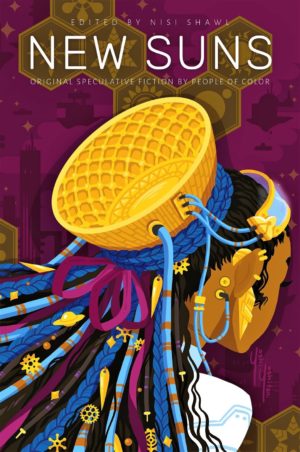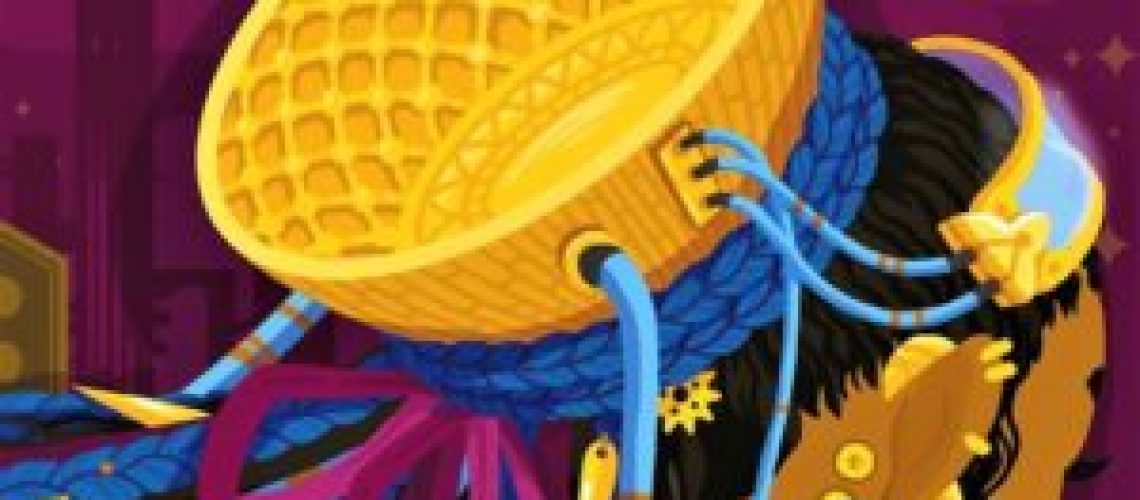Anthologies are my favorite way of discovering new writers, and they’re my favorite kind of books to review for Skiffy and Fanty, but some are harder to review than others. I’m a white woman living in a red state in Trump’s America, so my opinion on these works is probably the last anybody would want, but at least I’m in a position to beat the drums and pass the good stuff on to you readers, and I’ll tell you what: there’s good stuff aplenty in these pages.

Despite the ideas suggested by the book’s title, which is drawn from a quotation of the great black woman SF Master Octavia E. Butler*, there’s not really a theme uniting these stories beyond the marginalized status of their authors, although more than the usual percentage of its stories are experiments in storytelling form, as I’ll examine a bit more below. But other than these, the book doesn’t have a particular point to make beyond saying “hey, these writers, they’ve written some great stories and you don’t want to miss out on them, but you might if we don’t make some extra effort to get them to you.”
You know, kind of like a particularly good issue of a quality fiction magazine.
Anyway, I say that’s enough. And I’m grateful to editor Nisi Shawl and the rest of the crew who put this together for our enjoyment.
As so often seems to be the case when I approach collections like these, I encounter one story that I like so well, I consider it worth the purchase price all by itself, rendering any other good bits as bonus material. And by that standard, “The Virtues of Mistranslation”, by the intriguing Minsoo Kang, instantly rendered this book a must-have for me. One of New Suns’ longer works, it also has its most unusual storytelling conceit: it’s written as a piece of art criticism by the likes of, say, Aby Warburg, in which the narrator presents considerable scholarship, evidence and educated speculation about the true history illustrated by a famous mural in the story’s universe. Background figures assume greater importance as the narrator places them in a fully realized fantasy world with a rich history of commercial and political rivalry and tries to fathom their motives for committing deliberate errors — mistranslations — and the effect they had on the course of history. As I gushed on Goodreads, this is one of the coolest stories I’ve ever read. It would be unbearable at novel length, but it’s damned near perfect at this one.
In a similar but less subtle vein is E. Lily Yu’s “Three Variations on a Theme of Imperial Attire”. Another experiment in storytelling form, this is a self-aware deconstruction of “The Emperor’s New Clothes” (of course) that morphs into a critique of modern power structures and how they’re just as easily manipulated for all their supposed safeguards, as an old-fashioned hereditary monarchy is. I wonder if it’s an allegory for the immediate present or something?
Along with cool experiments in form, there’s also some just plain beautiful writing, as we see (no surprise) in Silvia Moreno-Garcia’s gorgeous “Give Me Your Black Wings Oh Sister”, a startling and vivid vignette that leaves the reader questioning the nature of its heroine even as one loves the written experience of her world.
Other stories go for cool spec-fic concepts that could have come from the pens of the genres’ great masters. Indrapramit Das brings us an Octavia E. Butleresque meditation on how settling on an exoplanet might change us utterly while creating a dark and creepy atmosphere all their own in “The Shadow We Cast Through Time”, while Tobias S. Buckell imagines the whole of planet Earth reduced to a resort economy frequented by slumming, thrill-seeking aliens in “The Galactic Tourist Industrial Complex.”
And there’s plenty of provocative food for thought in here, too. A character in “Robots of Eden”, for instance, has a criticism I hadn’t yet encountered of our possible cyber-enhanced future: “I hate the word posthuman!… It’s an excuse to claim we’re innocent of humanity’s sins.” We do that already, I know, when certain people complain about being blamed for their ancestors’ misdeeds. When we’re “Enhanced” like some, but not all, of the characters in this story (which is mostly about whether cybernetically mediated emotions will leave us with a love for storytelling), we probably will distance ourselves even more from the injustices of the past, which, for these characters, includes our present full of identity-based judgments and exclusions. But will we deserve to?
As with every collection, there are misses to go with the hits. One story squicked me out, one confused me, one bored me. But the hits — and I haven’t even mentioned all the hits, like another story with the glorious, unforgettable line “stop bearsplaining my own body to me!” — outweigh the misses, and even the misses have something special to offer.
They all bring new perspectives to our past, present and future. Which is what speculative fiction is for.
Keep it up.







